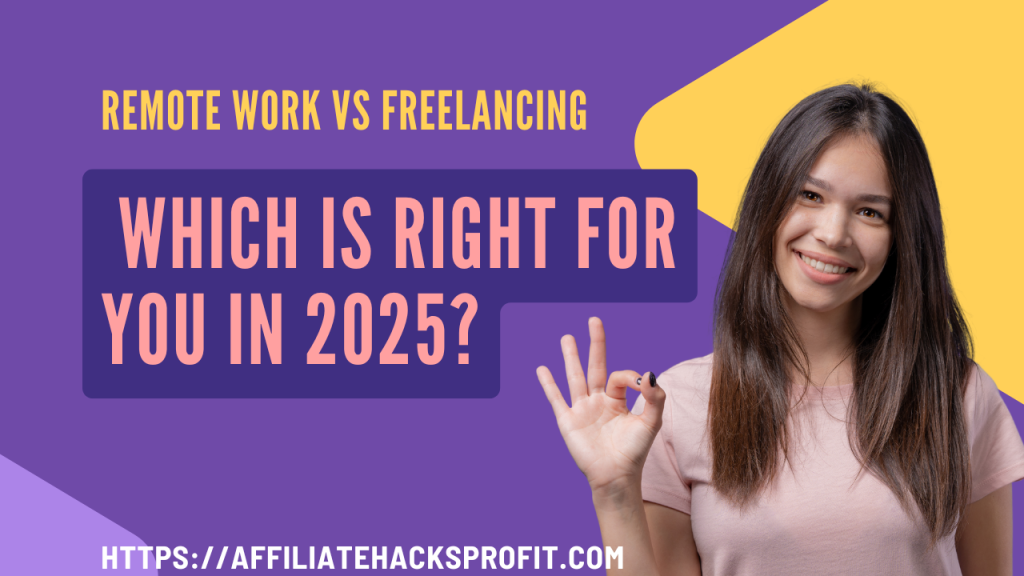Welcome to my article “Remote Work vs. Freelancing: Which Is Right for You in 2025?”. Gone are the days when “going to work” meant fighting traffic, squeezing into crowded trains, or pretending to enjoy small talk at the office water cooler. In 2025, work happens from anywhere—your couch, a beachside café, or even a hammock (if you trust your Wi-Fi). But with this newfound freedom comes an important decision: Should you embrace remote work with the security of a full-time job, or dive into freelancing, where you’re the boss but also the entire HR department?
Both options come with perks and pitfalls. Remote work offers stability, a regular paycheck, and the joy of having colleagues (even if they exist only as floating heads on Zoom). Freelancing, on the other hand, gives you total control over your schedule—want to work at midnight in pajamas? Go for it. But it also means dealing with unpredictable income and the occasional client who thinks “ASAP” means “yesterday.” So, which path is right for you? Let’s break it down, weigh the pros and cons, and help you decide whether you’re better suited for the structured world of remote work or the wild, independent ride of freelancing.
Steve is Making $20K+ monthly – Discover the EXACT SAME Secrets to Make $5,000-$10,000 Monthly >>>

Understanding Remote Work and Freelancing
To start, let’s clear up any confusion: remote work and freelancing are not the same thing—though they often get lumped together like a package deal. So, what exactly is the difference?
Remote work is basically the dream of working in your pajamas without the guilt of skipping out on “real work.” You’re employed by a company but get to do your job from anywhere—no office required. Think of it as having a boss (who probably emails you at 2 a.m.) but still enjoying the perks of avoiding rush-hour traffic. You’re usually on a fixed salary, and most of the time, the company still provides health benefits, paid leave, and the occasional Zoom happy hour. If you like the security of a steady paycheck and a more structured workday (but with the comfort of working from home), remote work might be your jam.
Now, freelancing is the wild, adventurous cousin of remote work. You’re in charge of your career, meaning you’re the one who decides when, where, and how you work. The catch? You also get to decide where your next paycheck is coming from. Freelancers work with multiple clients on a contract basis—think of yourself as a professional jack-of-all-trades, juggling various projects. The upside? Complete flexibility and the thrill of working with different clients. The downside? You’re responsible for finding clients, managing your own business, and hoping you remember to pay your taxes. It’s a hustle, but for many, it’s a fun and rewarding one.
Key Differences: Remote Work vs. Freelancing
Alright, let’s get into the nitty-gritty—what makes remote work and freelancing so different? Sure, they both give you the chance to dodge the daily commute, but when it comes to the details, it’s like comparing apples to… well, more apples, but ones that come with very different rules.
First off, employment status—this is where things get serious. As a remote worker, you’re still an employee, just like someone who works in a traditional office, except your office is wherever you choose to make it. You get a boss, regular hours (usually), and often a whole team to collaborate with. It’s cozy, predictable, and there’s no mystery about where your paycheck is coming from. Meanwhile, as a freelancer, you’re essentially a one-person business. You’re in charge of finding clients, setting your rates, and keeping track of your taxes (yikes). You’re not working for one boss; you’re working for a roster of clients, each with their own expectations, deadlines, and demands. It’s a lot of responsibility, but also a lot of freedom.
Now let’s talk income stability—or, in the case of freelancing, the lack of it. With remote work, you get that sweet, predictable paycheck. You know exactly when it’s landing in your bank account, and you can count on it like clockwork. Freelancers, on the other hand, live a little more on the edge. One month might bring in a pile of cash, and the next could leave you scrambling to chase down invoices. No steady paycheck here—just a rollercoaster of earnings.
Work flexibility is another area where these two diverge. Remote workers may have the luxury of working from home, but often they still have set hours—maybe even strict ones, like the dreaded 9 to 5 (or as close to it as possible). Freelancers, on the other hand, are the masters of their own schedule. Want to work at 2 a.m. in your pajamas? Go for it. The world is your oyster. But that comes with a catch—being your own boss means you’re also your own timekeeper. Some freelancers work around the clock to make up for dry spells in income, while others enjoy the ultimate work-life balance (for now, at least).
And then there’s job security and benefits. Remote workers are usually eligible for company perks like health insurance, paid vacation days, and maybe even the occasional holiday party (via Zoom, of course). Freelancers? Well, you’re on your own in that department. You get the joy of managing your own business, but that means taking care of things like taxes, insurance, and saving for retirement. The benefit here is that if you’re good at what you do, you can earn more than a remote worker—just don’t expect a 401(k) to magically appear in your inbox.
Lastly, workload management. Remote workers generally have a more structured workload set by their employers, so it’s a bit like following a recipe. Freelancers? They’re like chefs who make their own menu. You get to choose the clients, projects, and deadlines, but you also have to juggle multiple things at once—and sometimes it feels like you’re flipping pancakes while writing an email and negotiating a contract at the same time.
So, remote work is more stable with less freedom, while freelancing offers more freedom with the tradeoff of constant hustle. It’s all about what kind of ride you want.
Pros and Cons of Remote Work and Freelancing
Now that we’ve broken down the basics, let’s talk about the real stuff—the perks and the pitfalls. Every job has its shine, and every job has its… well, let’s just call them “learning opportunities.” Whether you’re eyeing remote work or freelancing, here’s a look at the good, the bad, and the occasionally awkward.
Pros of Remote Work
- Steady Income: One of the major perks of remote work is that steady paycheck. You’re still an employee, so you don’t have to worry about chasing clients or the dreaded “dry spell.” You’ve got a salary (and possibly a bonus, if you’re lucky).
- Employee Benefits: Health insurance, paid time off, and retirement plans—oh my! Remote work often comes with the same benefits you’d get in an office job, except you don’t have to wear pants to enjoy them.
- Team Vibes: You get to collaborate with a team, even if they’re spread across the globe. While you might miss the in-person coffee breaks, you’ll still feel connected through virtual meetings and shared Slack channels. Plus, there’s something oddly comforting about seeing your teammates’ dogs and kids pop in on Zoom calls.
Cons of Remote Work
- Less Control: Your boss is still your boss—even if they’re working from a different time zone. That means you might not have as much freedom when it comes to choosing your projects or shaping your schedule.
- The “Zoom Fatigue”: Working remotely sounds great, but those endless video meetings can feel like a never-ending parade of tiny squares on your screen. And let’s not even get started on the whole “Can you hear me?” saga.
- Work-Life Balance? What’s That?: When your office is your living room, it can be hard to switch off. The lines between “work mode” and “home mode” blur quicker than you can say “I’ll just check one more email.”
Pros of Freelancing
- Flexibility: Your schedule, your rules. Freelancers are the true masters of time—whether you prefer working at 3 a.m. or on a beach in Bali, it’s entirely up to you.
- Variety is the Spice of Life: Freelancers get to pick their clients and projects. If you’re bored with one task, you can move on to the next (or, you know, take a vacation and come back when you feel like it).
- Unlimited Earnings: Freelancers can set their rates and take on as many clients as they can handle. Want to charge a little more for a last-minute project? Go ahead! The more you hustle, the more you earn.
Cons of Freelancing
- Inconsistent Income: One month, you’re rolling in cash, and the next, you’re wondering if your last invoice even made it to your client’s inbox. Freelancing comes with the financial rollercoaster ride of unpredictability.
- No Benefits: There’s no HR department handing you a health plan or a 401(k). If you want health insurance or a paid vacation, you’ve got to make it happen yourself—unless you’re feeling lucky and want to hope that your freelance gig offers those perks (spoiler: they probably don’t).
- The Solo Struggle: It’s just you, your laptop, and maybe a cup of coffee for company. Freelancers can sometimes feel isolated, especially when you’re missing out on team bonding or office banter. Plus, you’re the one doing the admin work, the marketing, and the dreaded accounting (hello, taxes!).
Steve is Making $20K+ monthly – Discover the EXACT SAME Secrets to Make $5,000-$10,000 Monthly >>>
In the end, it all comes down to what you value more: stability or freedom. Both remote work and freelancing have their high points and their low points, but it’s all about finding which one fits your lifestyle, goals, and willingness to juggle.
Which Option Suits You Best?
We have broken down the remote work vs. freelancing debate in every possible way, so now it’s time for the real question: Which one is right for you? Grab your decision-making hat (and maybe a coffee to help with the serious pondering), because it’s time to take a closer look at how your lifestyle, goals, and personality might fit with either remote work or freelancing. Spoiler alert: There’s no one-size-fits-all answer—but there is a better fit for your individual needs. So, let’s break it down.
Best for Those Who Want Stability
If the idea of having a steady paycheck, reliable benefits, and the occasional annual bonus sounds like your dream come true, then remote work might just be your perfect match. Remote workers enjoy the best of both worlds: they get the flexibility of working from home but the security of a full-time job. If you’re the type who enjoys knowing exactly when and how you’re going to get paid (and perhaps even have health insurance that doesn’t involve calling your mom for advice), remote work could offer the stability you’re craving. Plus, if you’ve got a family or big financial responsibilities, the predictability of remote work can provide the security that freelancing often can’t.
Best for Those Who Value Independence
Do you thrive on autonomy and crave control over your work schedule? If you’re a “be-your-own-boss” kind of person who likes the idea of picking your clients, projects, and office location, freelancing might be calling your name. Freelancers don’t answer to a boss (unless they’re chasing down payments from a client). The flexibility of freelancing allows you to decide when and where you want to work. Want to take a Wednesday off and work on a Sunday? Freelancing says “go for it!” However, this lifestyle does come with a lot of responsibility—you’re not just the worker, you’re the manager, marketer, and accountant all rolled into one. So, if you enjoy the thrill of creating your own path and don’t mind the occasional chaotic day of project juggling, freelancing could give you the independence you’re craving.
Key Factors to Consider
Now, let’s get down to the nitty-gritty. Here are a few more things to think about when weighing your options:
- Financial Security: Do you need a regular paycheck to feel safe, or are you okay with the unpredictable highs and lows of freelance income? If the former, remote work might win out.
- Work-Life Balance: Are you more comfortable with a structured schedule, or do you prefer working in spurts when inspiration strikes (even if it’s at 2 a.m.)? If you want the latter, freelancing might offer more freedom.
- Career Goals: If you’re aiming for long-term growth, professional development, and maybe a promotion in the future, remote work could be your best bet. If you’re focused on variety, creativity, and gaining a wide range of experiences, freelancing might be your playground.
It’s not about which one is “better” overall—it’s about which one fits your personality and aspirations. Do you want to climb the corporate ladder (even if that ladder is leaning against your living room wall)? Or do you want to create your own ladder, one freelance gig at a time? The choice is yours, but it’s all about figuring out where you’re most likely to thrive.
Future Trends: The Outlook for Remote Work and Freelancing in 2025
The future. It’s always just around the corner, like that cup of coffee that almost keeps you awake long enough to get through your to-do list. But when it comes to remote work and freelancing, 2025 is looking like a wild ride, with trends emerging faster than you can say “Zoom fatigue.” So, what can we expect? Will remote work still be the go-to for the 9-to-5 crowd, or will freelancing take over the world (or at least your Twitter feed)? Let’s dive into what the future holds for both remote work and freelancing.
Increased Demand for Remote Jobs
Remote work isn’t just a pandemic-era trend anymore; it’s here to stay. Companies across the globe have realized that letting employees work from home—or from a beach in the Bahamas (lucky you!)—doesn’t actually make them less productive. In fact, it might even increase output. According to studies, remote work boosts employee satisfaction and retention, which means more and more businesses will likely adopt remote-first policies by 2025. So, whether you’re in tech, marketing, or customer service, expect the remote job market to keep growing.
Steve is Making $20K+ monthly – Discover the EXACT SAME Secrets to Make $5,000-$10,000 Monthly >>>
And here’s the kicker: It’s not just small startups jumping on the remote bandwagon anymore. Big companies are getting in on the action too. Major players like Twitter, Facebook, and Google are continuing to embrace hybrid or remote work models, making it clear that remote positions are no longer a novelty—they’re the future. If you’re already a remote worker, get ready for even more opportunities coming your way in 2025.
Freelance Economy: Growth Spurt Ahead
Freelancing is having a moment, and that moment is set to stretch well into 2025. The gig economy is booming, with more companies outsourcing specialized tasks to freelancers than ever before. Need a graphic designer for a last-minute project? A consultant for a one-off task? A content writer who knows all about cat yoga (yes, that’s a thing)? Freelancers have become an integral part of the workforce.
And the best part? The freelance market is expected to continue growing, especially in industries like tech, marketing, and creative fields. More businesses are realizing that they can tap into global talent without the overhead costs of hiring full-time employees. In fact, some reports predict that by 2025, freelancing will account for a significant portion of the global workforce. So, if you’re a freelancer or thinking about diving into the world of self-employment, the future is looking bright—and busy.
The Hybrid Model: The Best of Both Worlds?
What if you don’t have to choose between remote work and freelancing? Enter the hybrid model, where you mix the stability of remote work with the flexibility of freelancing. Many professionals are already adopting a hybrid approach, working remotely for a company while picking up freelance gigs on the side for extra income or personal growth. In 2025, expect this to become even more popular as people seek the perfect balance between stability and freedom.
Why settle for just one income stream when you can juggle both? A remote job provides the foundation of financial stability, while freelancing offers creative freedom and variety. This hybrid model allows workers to enjoy the security of remote work while having the option to take on freelance projects that spark their passion—or simply boost their bank account. It’s a win-win!
Tech Advancements: The Future of Work
Let’s face it—technology is changing everything, including the way we work. In 2025, expect even more innovation in the world of remote work and freelancing, thanks to the rise of AI, automation, and better collaboration tools. For remote workers, this means even smoother workflows, virtual offices, and AI-powered assistants that can handle everything from scheduling to email management. Goodbye, task overload; hello, productivity!
For freelancers, technology will open up a world of new opportunities. Platforms like Upwork and Fiverr are already evolving to make it easier for freelancers to find clients, track payments, and manage projects. And with AI on the rise, freelancers will have more tools at their disposal to help with everything from content generation to project management. So, if you’re a freelancer or planning to become one, get ready to leverage tech like never before. It’s the ultimate way to work smarter, not harder.
Workforce Evolution: From Employees to Entrepreneurs
By 2025, we’re likely to see an even more entrepreneurial workforce. With the rise of freelancing and remote work, more people are choosing to define their own careers and forge their own paths. The future is shaping up to be a mix of entrepreneurs, creators, and professionals who are empowered to work from anywhere, at any time, and in any way that suits them.
Companies will still exist, but the traditional idea of a “9-to-5 employee” will become more of an outlier. Instead, workers will be empowered to create careers that are as dynamic and diverse as they are. Whether it’s remote work with a side hustle, freelancing full-time, or blending the two, the future of work will be flexible, customizable, and, well, a little less predictable. But isn’t that what makes it exciting?
So, there you have it: The future of remote work and freelancing in 2025 is looking bright, flexible, and full of opportunity. Whether you’re already working remotely, freelancing, or dreaming of making the switch, the workforce is evolving, and it’s all about finding what works best for you. Ready to embrace the future? The choice is yours.

Conclusion
Well, here we are, folks. After diving deep into the world of remote work vs. freelancing, we’ve come full circle—and now it’s time for the grand finale. So, what’s the takeaway? The short answer is: It depends. Shocking, right? But hear us out—both remote work and freelancing have their unique perks and challenges, and choosing the right path for you comes down to your goals, personality, and how much you enjoy wearing pajama pants (it’s totally okay to love them).
If you’re someone who craves stability, enjoys a structured schedule, and likes knowing when your next paycheck is coming, remote work is your ticket to a cozy, predictable work life. You’ll still get the benefits of working from home—hello, no commute!—without the stress of constantly hunting for new clients or balancing a million freelance gigs. But, if you’re all about creative freedom, flexibility, and the thrill of running your own business, freelancing might be your jam. You’ll get to decide your hours, choose your projects, and—let’s be real—probably have more caffeine than most people should.
Steve is Making $20K+ monthly – Discover the EXACT SAME Secrets to Make $5,000-$10,000 Monthly >>>
In the end, whether you choose remote work, freelancing, or a hybrid of the two, remember: there’s no “right” choice—just the one that feels like the best fit for you. The workforce is changing, and you’ve got the power to shape your own career path. So, take a deep breath, grab that coffee (or whatever fuels your hustle), and take the leap into the future of work. Who knows? 2025 might just be your year to thrive, whether you’re leading virtual meetings or crafting your next big freelance project.
Thank you for reading my article “Remote Work vs. Freelancing: Which Is Right for You in 2025?” till the end. See you in another.











